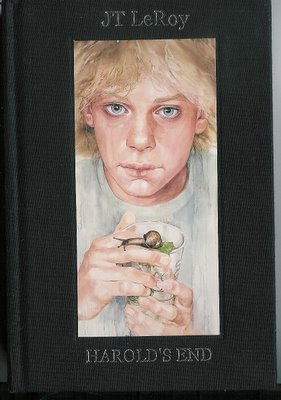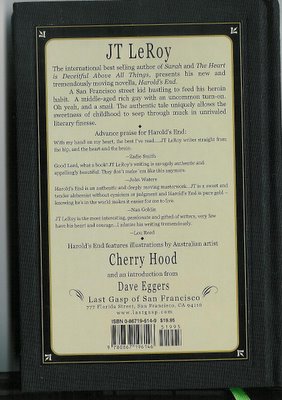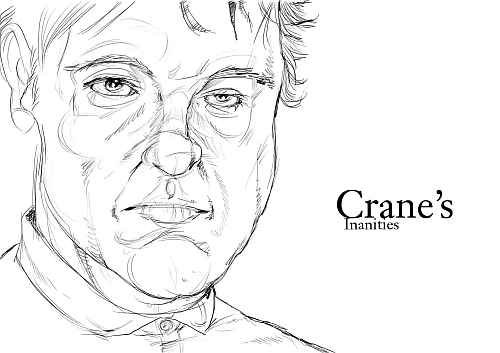 In additon to James Frey's outing as a fabulist posing as a memoirist, I learn that on Monday, the New York Times published an article revealing the true identity of the perpetually mysterious author JT Leroy. The two images I put onto this blog are not culled from Google Images. Oh no. I scanned these bad boys in myself. I bought this book for full price at Vroman's because Dave Eggers said in the introduction of the book that, and I'm not making this quote up, "JT LeRoy's first two books, Sarah and The Heart is Deceitful Above All Things, will prove to be among the most influential American books of the last ten years." I mean, why NOT buy a book when the writer gets an intro like that? Well, JT's a big fake. He's actually a she, as it turns out, and not a young, transgendered former child prostitute as he'd sold himself to be.
In additon to James Frey's outing as a fabulist posing as a memoirist, I learn that on Monday, the New York Times published an article revealing the true identity of the perpetually mysterious author JT Leroy. The two images I put onto this blog are not culled from Google Images. Oh no. I scanned these bad boys in myself. I bought this book for full price at Vroman's because Dave Eggers said in the introduction of the book that, and I'm not making this quote up, "JT LeRoy's first two books, Sarah and The Heart is Deceitful Above All Things, will prove to be among the most influential American books of the last ten years." I mean, why NOT buy a book when the writer gets an intro like that? Well, JT's a big fake. He's actually a she, as it turns out, and not a young, transgendered former child prostitute as he'd sold himself to be.I'm going to go out on a limb and briefly explain why I think the frauds perpetrated by LeRoy (actually Savannah Knoop whom no one suspects of actually writing the LeRoy books) and Frey, are wrong.
Frey first. I think Frey's offense is worse than LeRoy's because Frey put a "memoir" out into the world and filled it with bombastic, self-aggrandizing exaggerations and a lot of outright falsehoods. When it came out he said things to the press like, "I didn't invent anything." He sold his story as truth, which is one thing, but I think the duty of a memoirist in general is to, at the very least, try their best to write what really happened the way they saw it. No one reading the thing is expecting 100% fidelity to actual events, memory and life don't work that way, but I think about 100% of readers are expecting a memoir to relate the events of one's life as close to the writer's recollection as possible, and to not include deliberate lies and not to deliberately mislead their readers.
Part of why I think Frey opted for the memoir route as opposed to its original incarnation as a novel, was because his memoir often doesn't ring true. More often than not characters and the events related all get fantastically overblown. (Strangely, in most of the write-ups he's been getting today as a result of yesterday's expose, the fact that he's worked as a screenwriter is used as an explainer for his overcooked, bombastic style. As though most screenplays and screenwriters were all writing "The Last Boy Scout 2". I had no idea there was so much animus out there against screenwriting in general. But I digress.) For example, Frey couldn't just be on an airliner completely high on cocaine, he had to be out of his mind on cocaine, covered in all manner of bodily excretion, and with no memory whatsoever of how he'd gotten there. He couldn't just get arrested for drunk driving because he was sad about a girl, he had suffer a brutal police beatdown and narrowly avoid 3 years in jail because he was sad and angry about a girl. As a novel, editors and publishers weren't buying it, for whatever reason. Does that mean it's ethically okay for him to change the story around a little, slap "A Memoir" on its cover and call it good? Of course a half-baked novel about addiction and recovery will be more interesting as a memoir (at least to publishers), because all the crazy stuff you write about suddenly HAPPENED IN REAL LIFE. You get readers to turn OFF their bullshit meters when it's a memoir, where with a novel, most people only turn them down, and only to varying degrees depending on the story and the writer. It's cheap, and he got called on it and I think that's fine.
I think something similar happened with the movie Fargo. The Coens thought it'd be a gas if they put up a title screen that said what happened was based on true events. It was not. It was bullshit. Fargo was a story. They were lying and I don't think artists should get some kind of free pass under the guise of creative license. I think it's in the artist's best interest to be concerned with, and serious about truth. If you've written something with both fictional and non-fictional elements, you should be upfront about that. You've limited your audience by a lot when you do that, which is why I think someone like James Frey didn't want to be upfront about the more fictional elements of his book. Because when you do mix fiction and non-fiction you're essentially writing experimental fiction, and experimental fiction doesn't sell. When you're a writer primarily concerned with being "the best writer of my generation", as Frey once said he was, then it's not in your best interest to be upfront about the truth to hide a middling writing talent. You got to sell books after all.
 As for JT LeRoy. I don't know if he duped a lot of celebrities into thinking he (now she) was a literary genius, or if the true author was actually in league with the celebrities because she's a good writer who couldn't get a seat at the publishing table, and they wanted to help her with this new strategy of writing/performance art just to get her great stuff out into the world. I'm leaning at this moment towards the former. The NYTimes article seems to point less towards desperate measures taken in the name of art, and more towards devious measures taken in the name of opportunism, but there's not yet enough information out there to prove it one way or the other. Do I feel duped because I bought one of "his" books? Sort of, but not really. I knew there were questions regarding JT LeRoy's true identity when I bought it. I suspected, given his mind-blowingly lurid personal history, that he might be full of shit, but I also thought Eggers and all of the folks who gave blurbs for Harold's End (see above) had to be in on the joke if he was full of it, but also seriously thought the fiction itself deserved attention, (and so far as I know, it was always sold as fiction -- autobiographical fiction, but still fiction). So I played along -- I wanted to be "in the know", in with the literary "in crowd", so I bought it. Goof's on me. The stuff isn't bad, (and it has great full-color illustrations in it -- it's a nice edition anyhow) but worthy of the kind of praise Eggers was dishing out? Not by half. If Harold's End had been written by, for example, a 40-something male divorcee who'd attended Princeton and published a few stories in some little magazines back in the early nineties, would any of the "JT LeRoy novels" gotten the same attention written as they were by a transgendered, HIV-positive, West Virginian, former child prostitute who'd made good? Doubtful.
As for JT LeRoy. I don't know if he duped a lot of celebrities into thinking he (now she) was a literary genius, or if the true author was actually in league with the celebrities because she's a good writer who couldn't get a seat at the publishing table, and they wanted to help her with this new strategy of writing/performance art just to get her great stuff out into the world. I'm leaning at this moment towards the former. The NYTimes article seems to point less towards desperate measures taken in the name of art, and more towards devious measures taken in the name of opportunism, but there's not yet enough information out there to prove it one way or the other. Do I feel duped because I bought one of "his" books? Sort of, but not really. I knew there were questions regarding JT LeRoy's true identity when I bought it. I suspected, given his mind-blowingly lurid personal history, that he might be full of shit, but I also thought Eggers and all of the folks who gave blurbs for Harold's End (see above) had to be in on the joke if he was full of it, but also seriously thought the fiction itself deserved attention, (and so far as I know, it was always sold as fiction -- autobiographical fiction, but still fiction). So I played along -- I wanted to be "in the know", in with the literary "in crowd", so I bought it. Goof's on me. The stuff isn't bad, (and it has great full-color illustrations in it -- it's a nice edition anyhow) but worthy of the kind of praise Eggers was dishing out? Not by half. If Harold's End had been written by, for example, a 40-something male divorcee who'd attended Princeton and published a few stories in some little magazines back in the early nineties, would any of the "JT LeRoy novels" gotten the same attention written as they were by a transgendered, HIV-positive, West Virginian, former child prostitute who'd made good? Doubtful.I think Shawn brings up really good points in his comment on my last post, and a lot of this Frey business probably does have to do with perception. But because Frey was so unequivocal when the book came out about how true it was (because people were initially dubious even back then), this Smoking Gun article cuts him much deeper. Other memoirists get away with similar stuff, I think, because either they're a) more honest about the limitations of memory, b) less prone to completely making shit up like Frey does, or c) their books don't have to endure the same level of scrutiny Frey did because most memoirists aren't picked to be a part of her Book Club. I think fiction and non-fiction are great, experimental fiction is great -- I know that memoir's really hard to do with perfect recall and I respect any person who tries so long as the attempt is made in good faith -- but willful telling of untruths for purely dramatic reasons under the guise of fact doesn't do anyone any good. It doesn't limn the ever-fluid nature of Truth -- doesn't artfully explore the boundaries between one's identity and one's work -- all it does is mislead consumers, the ever-shrinking pool of readers, for one's own personal gain. To me, Frey's and LeRoy's fraud isn't much different than Dave Pelzer's fictitious childhood sold as fact in A Child Called "It", or Kevin Trudeau's snake-oil book Natural Cures "They" Don't Want You to Know About where he claims to have a cure for cancer. If the intention's are selfish and bad, a lie's a lie's a lie? Right?
Okay, enough of my pompous, rantings. In other, more mundane Crane-related news, I took my Crown Vick in to the body shop this morning. $688 for the dent the tractor-trailer made (all covered by USAA), and, if I want, just $50 to fix the dent made by the Russian dude who drove my stuff from Atlanta to Pasadena. May do that, too. Not much else besides that and writing today. Hope everyone had an awesome Tuesday. Please weigh in with opinions. More tomorrow.

3 comments:
What's wrong with opportunism? I don't think keeping your integrity and being opportunistic are mutually exclusive. Then again, I'm not really in the mood right now to bolster my opinion with any sort of thoughtful perspective, so let me just say this: Will ethics lead you to sell your novel?
However, being the advocate to ol' Lucifer himself, let me also say this: I get you. I think integrity is the most important value a human can keep hold of, but are there times when that integrity should take a backseat in order to accomplish what is driving you, what compels you to have that integrity in the first place? Would you, Crane, put a simple, two line blurb at the beginning of your novel stating it was based on real events if you knew a publisher would the publish it? Knowing that maybe, just maybe, this could be the forgivable first leap into becoming what you've always wanted to be? Or would you squander that chance, the possible only chance, to experience the great beginning to what you've made your lifelong journey?
And what does 'integrity' truly mean when you've reached the end of your life knowing that you could've made it that much easier, that much more comfortable, that you could've done what you've always wanted to do: get published? Because, in a hundred years, you will be dead. In a hundred years, no one will know who Crane is. In a hundred years, your integrity won't mean diddly. In a hundred years, people won't be regretful of how such an honest and upright person like you could go his entire life without publishing his works when liars and deceitful men make the break.
Nah, in a hundred years no one will care. They won't even care about the crooked being crooked. In fact, the crooked, the Rockafellers, the Bushes, even the Hitlers, will most likely be remembered and regretfully most times honored for their acheivements (except for Hitler -- can't see anyone sanely rooting for that guy). The Nobel Peace Prize winners will slip silently into obscurity.
Yeah, that's about right.
Booooooooooriiiiiiiiiing!
What about Memoirs of a Geisha? I though it was a true story and then at the end, this WHITE GUY says he made it up, but HE CAN because he knows all about that culture. I was so angry I tore the book in half, and then entered the strong man competition because before that I didn't know I had the strength to rip a book in half. So now I'm working on phone books and my upper body, the delts and what not.
But, "I digress" what I mean to say is, why does that author talking about Japanese prostitues get to call it a memoir and then make it into what I've heard is a bad movie? Hmmm? And these other guys get put through the wringer? Maybe I should have done more research about the author, but the word memoir hits my ear as a true story. So I know the pain you must be feeling.
But the best way to stop the pain is to stop going brokeback over authors. Mmkay. I'm out.
Post a Comment